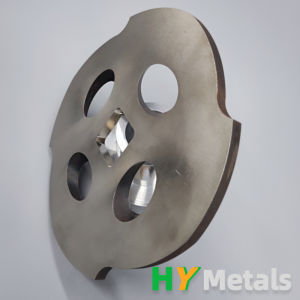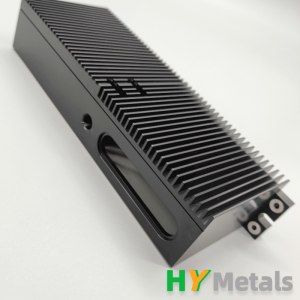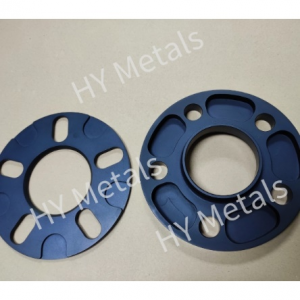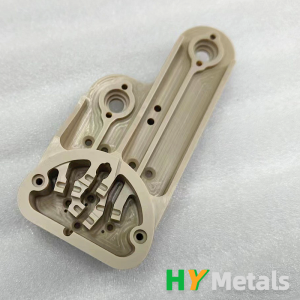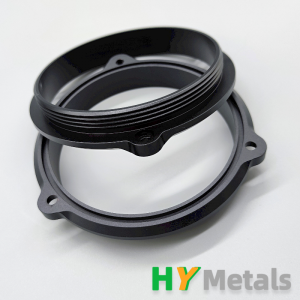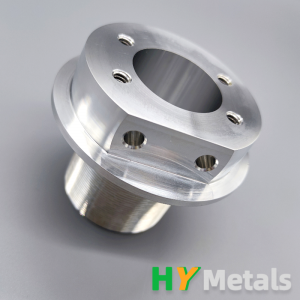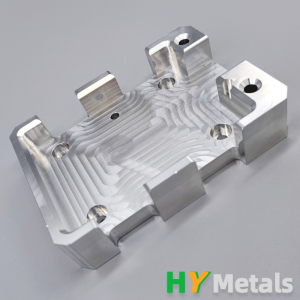Custom precision CNC machined Titanium parts with shot turnaround
Difficulties in CNC machining and anodizing of Titanium alloy parts
CNC machining of titanium alloys presents a unique set of challenges due to the inherent properties of the material. Titanium is known for its high strength-to-weight ratio, corrosion resistance, and biocompatibility, making it a popular choice for aerospace, medical, and automotive applications. However, these same characteristics also complicate the machining process.
Processing Challenges
1. Tool Wear: Titanium alloys are known to be abrasive, causing rapid tool wear. Titanium’s high strength means cutting tools must be made from advanced materials such as carbides or ceramics to withstand the stresses involved. Even with these materials, tool life can be significantly shorter than when machining softer metals.
2. Heat: Titanium has a low thermal conductivity, which means the heat generated during processing does not dissipate as quickly. This causes thermal deformation of the workpiece and cutting tool, resulting in poor surface finish and dimensional inaccuracies. Effective cooling strategies, such as the use of high-pressure cooling systems, are critical to mitigating this problem.
3. Chip Formation: The way titanium chips form during machining can also cause problems. Unlike softer metals that produce continuous chips, titanium typically produces short, fine chips that can become tangled with the tool or workpiece, further complicating the machining process.
4. Machining Parameters: Choosing the correct cutting speed, feed rate and depth of cut is crucial. Parameters that are too aggressive can lead to tool failure, while settings that are too conservative can result in inefficient machining and increased production time. Finding the best balance requires extensive experience and testing.
5. Workpiece Holding: Titanium has a low modulus of elasticity, which means it will deform under pressure, making workpiece holding a challenge. Specialized fixtures and clamping methods are often required to ensure parts remain stable during machining, which can add complexity and cost to the process.
Anodizing Challenge
After CNC machining is complete, anodizing the titanium alloy further complicates the manufacturing process. Anodizing is an electrochemical process that enhances corrosion resistance and provides a beautiful finish. However, anodizing titanium comes with its own set of difficulties.
1. Surface Preparation: The surface of titanium must be carefully prepared before anodizing. Any contaminants, such as oil or processing residues, can cause poor adhesion of the anodized layer. This often requires additional cleaning processes, such as ultrasonic cleaning or chemical etching, which increases production time and cost.
2. Anodizing process control: The anodizing process of titanium is sensitive to various parameters, including voltage, temperature and electrolyte composition. Achieving a uniform anodized layer requires precise control of these variables. Variations can result in inconsistent color and thickness, which is unacceptable in high-precision applications.
3. Color Consistency: Anodized titanium can produce a range of colors depending on the thickness of the anodized layer. However, achieving consistent color across multiple parts can be challenging due to variations in surface finish and thickness. This inconsistency can be problematic for applications where aesthetic uniformity is critical.
4. Post-anodizing treatment: After anodizing, additional treatments may be required to enhance the performance of the anodized layer. These may include sealing processes, which can further complicate workflow and increase production time.
In conclusion
CNC machining and subsequent anodizing of titanium alloys are complex processes that require specialized knowledge, equipment and technology. Machining-related challenges, such as tool wear, heat generation and chip formation, coupled with the complexities of anodizing, emphasize the need for careful planning and execution. As demand for high-performance titanium components continues to increase across industries, overcoming these difficulties is critical for manufacturers aiming to meet stringent quality and performance standards.
HY Metals is an expert in CNC machining with more than 14 year experences ,we machined lots of Titanium parts with high precision and good quality.
Here are some new arrivals of CNC machined Titanium parts made by HY Metals.
HY Metals provide one-stop custom manufacturing services including sheet metal fabrication and CNC machining, 14 years experiences and 8 fully owned facilities.
Excellent Quality control, short turnaround, great communication.
Send your RFQ with detailed drawings today. We will quote for you ASAP.
WeChat:na09260838
Tell:+86 15815874097
Email:susanx@hymetalproducts.com







